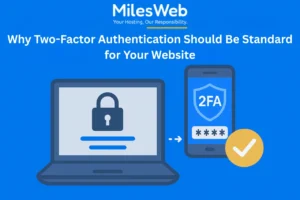Physical Address
304 North Cardinal St.
Dorchester Center, MA 02124
Physical Address
304 North Cardinal St.
Dorchester Center, MA 02124

An additional security layer shields the sensitive data of online accounts. Beyond a password, it is a crucial step to consider to prevent hackers from accessing sensitive data.
Cyberattackers utilize complicated viruses and malware breaches to gain unauthorized access to users. To business owners, bloggers, and online store owners, a compromised account with the low cost web hosting means the loss of data and customer information, potentially causing damage to their reputation.
Here is where 2FA (Two-Factor authentication) can be used as a simple yet powerful protection tool. By compelling users to provide more than just passwords and offering a secondary method of verification, it significantly minimizes unauthorized logins.
It is no longer a nice-to-have addition to the security toolset; it must be the norm with every site to store sensitive information or manage user accounts.
Passwords are crucial, regardless of their strength and vulnerability to theft and guessing. Hackers exploit reused or weak passwords to break into accounts before they move website for free.
Two-factor authentication solves the problem of requiring a second piece of evidence, like a text message code, an authentication app code, or a biometric confirmation. Even if a hacker manages to steal a password, they cannot access the account without this additional factor.
Brute force attacks involve repeatedly trying various username and password combinations until one is likely to be accepted. Attackers use automated tools to guess combinations in the thousands with minimal success in a few moments.
2FA allows disabling brute-force attacks. Even if the hacker deciphered the password, they are stopped by the second authentication process. This highly reduces the chances of unauthorized access to your website's admin panel or customer accounts.
Customer trust is everything for websites that manage user data. Those seeking reassurance that their information, including contact details and payment data, is secure.
By developing 2FA as a standard feature, you send a clear message about the security priority. This not only builds trust but also sets your business apart as one that values customer safety in an era of growing cyber risks.
Small businesses often assume that advanced security tools are expensive or complex. The truth is, most CMS platforms like WordPress offer free or 2FA plugins. Web hosting providers and website security tools often include 2FA as part of their standard offerings.
With a low barrier to entry, you can add a strong layer of protection without breaking the bank. Just to put things in perspective, when you consider the financial and reputation cost of a data breach, the answer is easy.
Phishing is one of the common methods that hackers use to steal credentials. Many cautious users also fall into the trap of a fake login page.
With 2FA in place, stolen passwords alone aren't enough for attackers to succeed. The secondary verification step blocks their attempts, making phishing campaigns significantly less effective.
For websites, admin accounts are the biggest targets. If any attackers gain admin access, they can deface content, install malware, or steal customer data.
Enforcement of two-factor authentication for administrator logins means that, should their credentials ever become leaked, hackers still won’t be able to log in. For most sensitive areas of a website, it is a reasonable precaution.
Two-Factor Authentication is no longer a simple optional security enhancement; it is now essential to security when protecting websites from changing cyber threats. Adding a layer of protection on top of passwords minimizes the risk of unauthorized access, brute-force attacks, and phishing-related compromises to the website.
For small businesses, bloggers, and businesses in general, 2FA is a relatively inexpensive, convenient, and extremely effective way to protect your business and your users' confidence in using your services. Encouraging the use of 2FA on your website should not simply be the smart course of action; it should be deemed necessary to ensure long-term digital security.